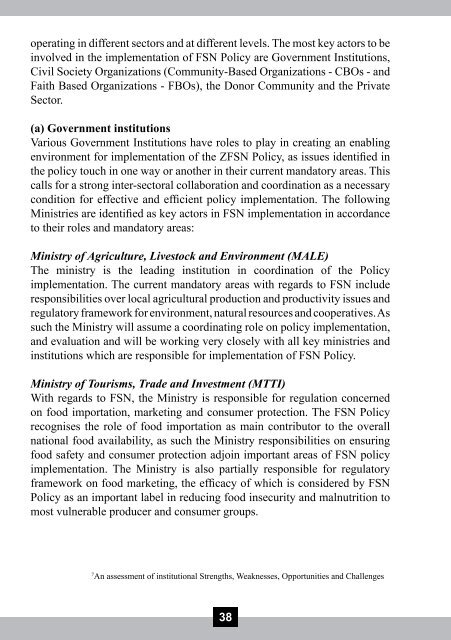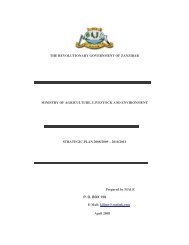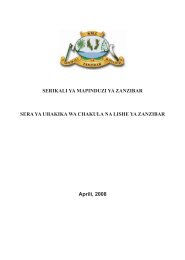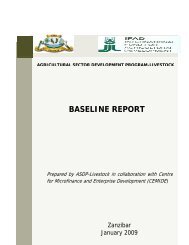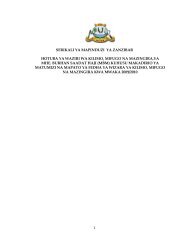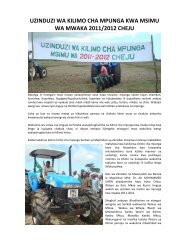ZANZIBAR FOOD SECURITY AND NUTRITION POLICY - Kilimo
ZANZIBAR FOOD SECURITY AND NUTRITION POLICY - Kilimo
ZANZIBAR FOOD SECURITY AND NUTRITION POLICY - Kilimo
Create successful ePaper yourself
Turn your PDF publications into a flip-book with our unique Google optimized e-Paper software.
operating in different sectors and at different levels. The most key actors to be<br />
involved in the implementation of FSN Policy are Government Institutions,<br />
Civil Society Organizations (Community-Based Organizations - CBOs - and<br />
Faith Based Organizations - FBOs), the Donor Community and the Private<br />
Sector.<br />
(a) Government institutions<br />
Various Government Institutions have roles to play in creating an enabling<br />
environment for implementation of the ZFSN Policy, as issues identified in<br />
the policy touch in one way or another in their current mandatory areas. This<br />
calls for a strong inter-sectoral collaboration and coordination as a necessary<br />
condition for effective and efficient policy implementation. The following<br />
Ministries are identified as key actors in FSN implementation in accordance<br />
to their roles and mandatory areas:<br />
Ministry of Agriculture, Livestock and Environment (MALE)<br />
The ministry is the leading institution in coordination of the Policy<br />
implementation. The current mandatory areas with regards to FSN include<br />
responsibilities over local agricultural production and productivity issues and<br />
regulatory framework for environment, natural resources and cooperatives. As<br />
such the Ministry will assume a coordinating role on policy implementation,<br />
and evaluation and will be working very closely with all key ministries and<br />
institutions which are responsible for implementation of FSN Policy.<br />
Ministry of Tourisms, Trade and Investment (MTTI)<br />
With regards to FSN, the Ministry is responsible for regulation concerned<br />
on food importation, marketing and consumer protection. The FSN Policy<br />
recognises the role of food importation as main contributor to the overall<br />
national food availability, as such the Ministry responsibilities on ensuring<br />
food safety and consumer protection adjoin important areas of FSN policy<br />
implementation. The Ministry is also partially responsible for regulatory<br />
framework on food marketing, the efficacy of which is considered by FSN<br />
Policy as an important label in reducing food insecurity and malnutrition to<br />
most vulnerable producer and consumer groups.<br />
7<br />
An assessment of institutional Strengths, Weaknesses, Opportunities and Challenges<br />
38


